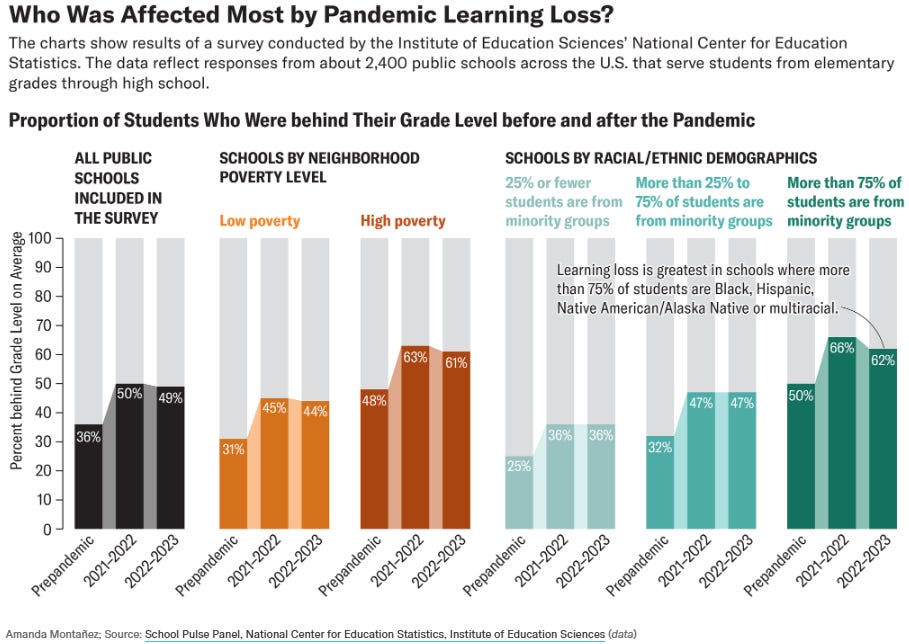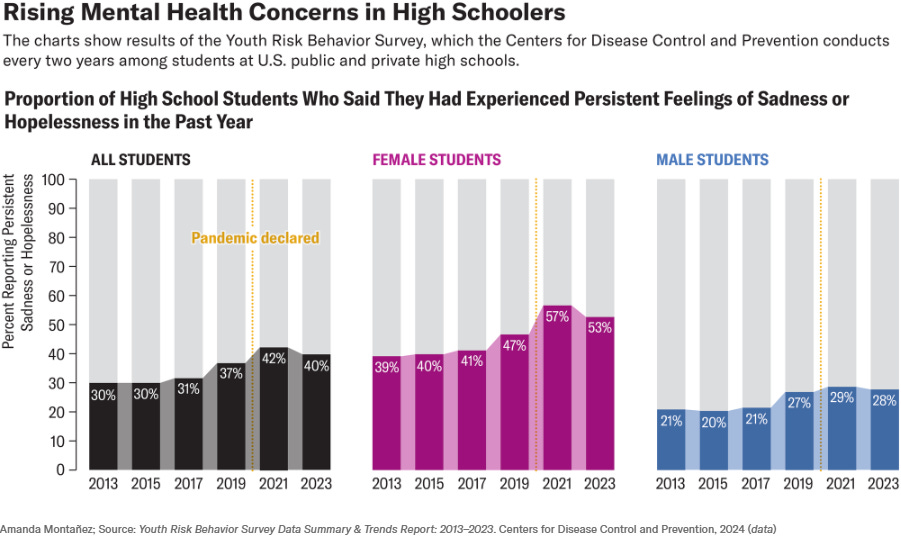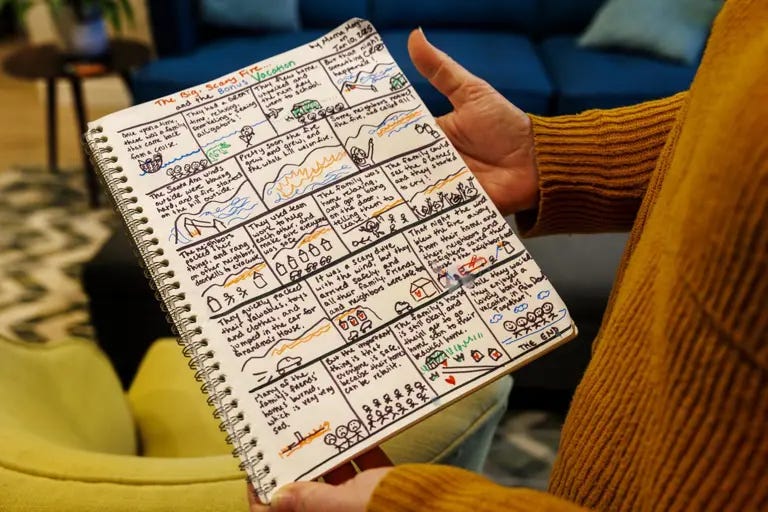- Scholastic Alchemy
- Posts
- Links and Commentary 3/14/25
Links and Commentary 3/14/25
Kayla Scanlon, DOE Cuts, Tenure and Self-interest, School Reform and Mental Health, Covid-19 and the Kids, LA Fires Knock-on Effects
Apologies! This post is usually scheduled for 6am on Fridays but that requires me to have written it during the week. My little one was home with an ear infection, and it threw me off schedule. Commentary will be a bit less this week as a result. In other news, I am struggling to come up with a good reason to put up the paywall and might just keep a standing request for voluntary paid subscribers instead. Unsure. With the economy seemingly about to crater and lots of educators facing threats to their job security, it seems like a bad time to ask my few readers for money.
Recommending Kayla Scanlon
Although I write primarily about education, most of what I read is probably media and socials media journalism related to politics, finance, business, and economics. I find that staying current and literate with these subjects helps me better understand the macro-forces impacting education as well as makes me a more educated citizen. One of the things that happened five years ago as the world shut down for the pandemic is that social media journalism exploded. Much of it was and continues to be worthless even if popular. I’m looking at you, creators who literally just read headlines! But, some of these people have proved incredibly insightful and I still follow today. Today’s recommendation is Kayla Scanlon. If you’ve read about or heard the phrase “vibe-session” in the last two years, she’s the one who coined that term. Her March 12th newsletter post is a great example of the breadth of her writing, explaining current financial turmoil as partly the result of bot-driven parallel realities, attempts to create a separate economy for MAGA-stans, an engineered recession, and several other fascinating analyses. One of the major themes in her writing is that perception is more important than underlying fundamental reality in trying to understand everything from markets to politics to individual behaviors. Anyway, she’s worth reading or following on socials.
Cuts to the Department of Education
Our president is making good on his promise to dismantle the department of education one way or another. The department laid off 1,300 employees with another 600 or so taking a voluntary retirement. I am skeptical that the president will fully close the Department of Education for two reasons. First, he needs Congress to actually dissolve the agency, and they are probably happier with a version of the DoE that enforces their ideological commitments. Which brings me to the second point, that conservative culture warriors would prefer the DoE continue to exist so they can attack trans people (seriously, this is their job now), use student loans and grants as a way to reshape who can attend colleges and universities, and follow up on public reports by investigating schools doing DEI things. You can’t have a Department of Education do those things and cease to exist at the same time. Maybe they’ll move those functions to other agencies. Maybe they won’t. It’s hard to know what the future will hold but the working being done right now suggests an ideological DoE that uses federal powers to enforce conservative ideas around what schooling should be, who it should be for, and how the money is distributed. As I have previously written, the long-term goal is the same as it has been since the 1950s (or since Reconstruction?): remove any barriers to segregated schooling and place public tax dollars in the hands of Christian churches. Some of that will be accomplished by moving as much power and money to the state level as possible. Indeed, states already have almost exclusive control over K-12 schools with the federal role being only enforcement of civil rights and providing funding for poor kids and kids with disabilities. We can expect the money (that’s not cut from the next budget) to go to the states as block grants and we can expect minimal, if any enforcement by the DoE. Call your representatives, especially if they’re Republicans! They’re the only ones who have any power. Tell them to stop ceding it to the executive branch. While you’re at it, remind them that universal pre-kindergarten pays for itself.
What does self-interest have to do with tenure?
Timothy Burke is a history professor at Swarthmore College and writes a daily blog that I’ve followed for a few years now. He writes a lot about academia and had a recent post about the relationship between professors getting tenure and the sense that tenure makes them purely self-interested. He makes the case that in the present situation, with national and (some) state leadership working to destroy what universities are, that self-interest is warranted. It is, however, only warranted if it’s done to protect disciplines targeted by the right, protect practitioners of those disciplines, and preserve their research and bodies of knowledge.
The thing is that defending self-interest in this context is also always defending the interests of others. In the end, that’s why faculty often perceive their disciplines, their research, their teaching, their collegiality as an extension of self. There’s been so much talk about how our sense of vocation has been twisted to encourage academics to accept impoverishment and mismanagement. Some faculty have suggested that we have to abandon our devotion to the profession, our sense of a responsibility to something bigger than ourselves. But now, as we fight for our survival, that is our dearest asset. Because if we save ourselves, our jobs, our disciplines, our institutions, we are saving so much more than ourselves. We are saving all the jobs that depend on our jobs. We are saving our students and all the work they do, have done, will do. We are saving our communities. We are saving knowledge and the possibility of truth.
In medicine, when you have more sick and dying patients than you can feasibly handle, you have to make difficult decisions about who to help and who to leave alone. If you’re not severely sick or injured, you have to wait not matter how uncomfortable you may be. If you are too severely sick injured and the time and effort of treating you is futile, those resources are better spent elsewhere. It means you die so that someone else can get life-saving care. You’re dead either way so the decision, while fraught, is ethically acceptable. The trouble starts when you have someone who may die from illness or injury but could be saved with heroic effort and intensive devotion of time and resources. Sure, their life could be saved but is it at the cost of saving multiple other critically sick or injured people? Someone somewhere has to make a judgement call and that decision is going to leave people dead who otherwise would not be dead. Emergencies create the need for different ethical reasoning That is, I think, what Timothy Burke is talking about here even if he doesn’t quite come out and say it. Tenured faculty need to fight for their disciplines to survive first, because those are the sources of knowledge and employment and everything else. Self-interest is, in some situations, the warranted course of action.
School reform in the UK led to declines in mental health
Peter Gray is a well-known “unschooler,” meaning he’s generally opposed to formal, highly organized schools on the grounds that they’re not designed to allow kids to learn naturally, grow normally, or become mature mentally stable adults. I have some sympathies for this argument, and I routinely point out that schools have goals that are somewhat unrelated to student wellbeing. One of the key differences between me and someone like Gray is that I don’t think schools have to be engines of child oppression even if adults do sometimes have to curtail kids’ liberty because we judge it to be the best for them, for us, or for society. Still, he’s worth reading and his blog martials a lot of interesting data, especially about the link between the last 30 years of school reform and students’ mental health. Here’s a good thesis statement for this part of his advocacy:
Surveys in the United States and other countries routinely reveal that the single most prevalent source of psychological distress—and hence of anxiety and depression—among school-aged children, especially teens, is school pressure. This should not be surprising. Children spend more time in school than anywhere else except home, and while at school they have very little opportunity to make their own choices and are continuously evaluated for their performance in comparison to other students. Moreover, many students in recent times have been led to believe (falsely I have argued) that school performance is the primary determinant of future success. When nations adopt strict school policies that reduce the choices that teachers and students can make and increase the weight of one-size-fits-all tests, student suffering increases.
His post, however, is about school reforms in the UK. While it is not quite as evidence-stuffed as his writing about the US, it’s worth checking out.
Systematic surveys have revealed that onset of the just-described UK school “reforms” was followed by significant increases in school pressure and school dissatisfaction and declines in psychological wellbeing among UK school-aged teens.
How did Covid-19 shape a generation of kids?
Scientific American has a somewhat upbeat story about how, five years on from the pandemic, kids are not a “lost generation.”

Data Source

Data Source
This is in line with other research that I’ve mentioned showing that suicide rates are down, and that mental health is not quite as dire as predicted. I have a feeling this is something of a general bias in humans. We identify a trend and act as though it will last forever. We should know better, but the immediacy of a problem sometimes overwhelms our sense that change is possible. Maybe that’s a type of recency bias?
Kids losing sleep following the LA fires
It’s paywalled but the headline is the gist of it. If you can stand it, here’s a version that’s served through MSN.
In the two months since the fires, children have been are experiencing meltdowns, sleep issues and separation anxiety. For the youngest fire victims, this can include returning to earlier stages in their development, said Gregory Leskin, a psychologist and program director with the National Child Traumatic Stress Network at UCLA.
For the youngest children, who do not yet have the words or emotional development to express their grief, the response to the fires can be more unconscious and physical.
Since they evacuated from the flames, Kyle Massie says, his 5-year-old son at times seems to have "almost reverted back to a toddler." Their home survived, but the trauma of the day has remained.
A previously talkative child, the boy has started sometimes speaking in a "minion language." When Massie asks him a question, his son responds several times in gibberish before finally answering in a language his dad can understand.
His son also had a bathroom accident at school for the first time in two years. “I almost feel like there are these unconscious regressions," Massie said. "He was really shook and upset by it.”
Clover, 9, and Henry, 7, sit at the dining room table of the friend’s house where the Bull-Gehling family is currently staying — their sixth stop since they lost their house in the Eaton fire.
Henry pages through the binder of Pokemon cards he grabbed as the family evacuated, along with his blanket. Clover scooped up a few stuffed animals, but can't stop thinking about the one they left behind: Caravaggio the lamb, their first stuffy.
"The anxiety doesn't feel good when I go to sleep," said Clover, who uses they/them pronouns. "I imagine what it would be like to be my favorite stuffed animal, Caravaggio, and the fires coming and reaching her."
Clover also sometimes dreams about what their pet fish might have felt when the flames engulfed its glass bowl.
I wrote about disruptions to school in my March 5th letter. One of the points I made was that our responses to disasters do not pay enough attention to non-academic needs that kids may have following the disaster. We want them back in school and learning like they did before but we, at a society or policy level, don’t want to do the harder work of promoting real recovery. That would require being okay with kids being behind, with learning loss, and with putting a hold on academics while mental and emotional recovery is centered. It’s not work our schools were designed to do.

Cassie Manjikian holds her comic-book story of "The Big Scary Fire and the Bonus Vacation," which she wrote to help the children process their frightening evacuation during the Eaton fire. ((Gina Ferazzi/Los Angeles Times))© (Gina Ferazzi/Los Angeles Times)
Would your school make time for kids to process their experiences through, for example, writing a comic book story recounting what happened to them? Even if your school is not impacted by an event right now, is there space for kids to do this kind of work and respond to the mental and emotional impacts of the adversity of everyday life? Do your counselors have time to do this, or are they busy preparing kids for college and career readiness? Do your teachers have time to do this or are they busy preparing kids for the upcoming state exams? Does your state hold your school accountable for those exam scores no matter what?
It doesn’t have to be this way!
Thanks for reading!